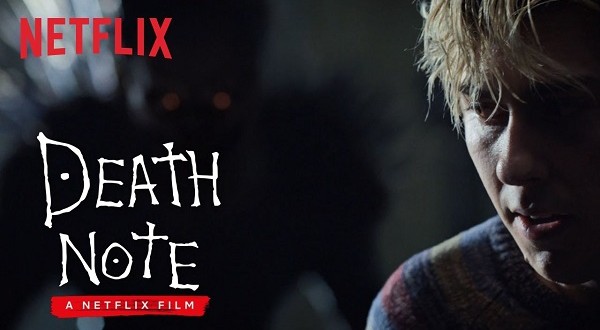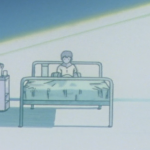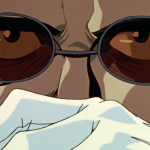Death Note: Reviewed
Death Note (2017)
Cast: Nat Wolff, Lakeith Stanfield, Margaret Qualley, Willem Dafoe
Director: Adam Wingard
Death Note is a movie that my teenage self would love to the ends of the Earth; full disclosure, teenage me was the worst.
Adam Wingard’s adaptation of the manga/anime Death Note is about a moody, too smart for his own good loner called Light (Wolff), who gains power over life and death via a demon (Dafoe) and his magic notebook. This leads Light to Mia (Qualley), an outcast girl who comes to love Light and his power – mostly his power. Together, they become a serial killer known as Kira, who punishes the arch-criminals and monsters who have eluded conventional justice. Their actions invoke the wroth of the world’s finest ninja detective (Stanfield) for a game of cat and cat, in that there are many scenes of things being knocked off tables.
By most reasonable standards, it is a middling trending toward poor movie. Even Willem Dafoe as a death god feels like little more than a retread of Norman Osborne/Green Goblin in Sam Raimi’s lamentable Spider-Man films. And yet it works for what it is: a low-concept YA piece. Find me a teenager who doesn’t A) want to punish the wicked by virtue of their own self-styled superiority B) long for that certain someone to understand them and C) crave agency over their life and you’ll likely see them sitting next to a field being tilled by a leprechaun intent on reaping a magic bean harvest.
To that end, a general (read: adult) audience will look at Death Note and wonder why they invested 104 minutes of their life in a story that reaches its affective apoapsis to Berlin’s Take My Breath Away. Death Note bleeds nostalgia amid a sterilized vision of contemporary Seattle for the simple reason that Adam Wingard presided over a movie meant to appeal to the sullen and ersatz disenfranchised.
Light’s ability to kill from a distance by writing a person’s name in the eponymous Death Note leads him to flirt with the idea of being a god after his own image. This would have been an interesting angle. Alas, the writing never takes him as close to said delusion as his namesake in the source material. Such a sense of inhuman arrogance would alienate the character from his target audience. Light as Lucifer, the literal light bringer, would commit his character to being an antagonist in a film whose spirit embodies a tired “meh” of indifference toward ideas of good and bad. His weak resolve and vacillation over the power of the Death Note to exact righteous judgement upon humanity’s worst scum keeps the discourse rooted at a high school level of sophistication.
Such an approach encourages the target demographic to see themselves as both Light comme Moriartiy and as Lakeith Stanfield’s “L” comme Holmes (substituting sugar for heroin/opium and a surrogate father figure for Watson). One could be forgiven for seeing this take on Death Note as a fan fic that filed off the serial numbers from BBC’s Sherlock. Nowhere is this more evident than in Mia transforming from underage goth(?) sex kitten to a manipulator of weaponized sex that would make Irene Adler proud. Given the context, this transformation is utterly cringe worthy.
The entire production is as sophomoric and tedious as its intended teenage audience. Which puts an adult/critical audience in an interesting place when writing about Death Note. There is a straight line between Light Turner and Tyler Durden, and that gives it a whiff of something legitimate. Contrivances in the plot are couched in the tedious but barely logically consistent arguments that empower so many internet trolls, thus they stand up to a cursory examination. The entire production is blithely honest about what it is trying to do. This is not high art. Nor is it a self-serious but poorly assembled story, a la Battleship. This is Death Note for the creatures of pure id that prowl the internet like the psychic monster of Forbidden Planet, howling “not all men,” and “cuck” in equal measure.
In that context, responding to white washing and the decision to transplant a story originally set in Japan feels like so much ineffective finger wagging. This story is so rooted in the petulant, “lolz, whatever, man” of teenage angst that it can stand behind a shield of its own ethos in responding to critical discourse. Even if you care, Death Note doesn’t, and that’s good enough for Death Note.
This is not a defense of the systemic racial bias that turned Light Yagami into Light Turner. Instead, it’s a sigh of resignation as I recall the parade of glowing reviews over Edge of Tomorrow’s adaptation of All You Need Is Kill. Recall the extended critical applause it met as it turned Keiji Kiriya into Tom Cruise’s Bill Cage and relocated the setting from Japan to France. The fact that 91% of professional critics (per Rotten Tomatoes at the time of this review’s writing) liked that movie and were inclined to glaze over or outright ignore its potential problems with erasure, makes it easier, not harder, for Death Note to do the same.
Precedent and intention allow Death Note to sidestep the issues of representation that should reduce its creative controllers to penitence. The final product is just barely good enough to say, “I am a Young Adult thing; I don’t need to engage with your critical race discourse,” while still having the chutzpa to look at itself in the mirror. It can point to worse offenders, Rupert Sanders’ Ghost in the Shell comes to mind, and say, “see, I’m not like them. I’m one of the good guys.” I suppose Light Turner, a white character played by a white actor, is marginally better than Scar Jo playing Motoko Kusanagi in Ghost in the Shell, but that’s about the same as saying one would prefer a punch in the stomach over a kick in the bollocks. I, for one, would prefer neither of those options.













